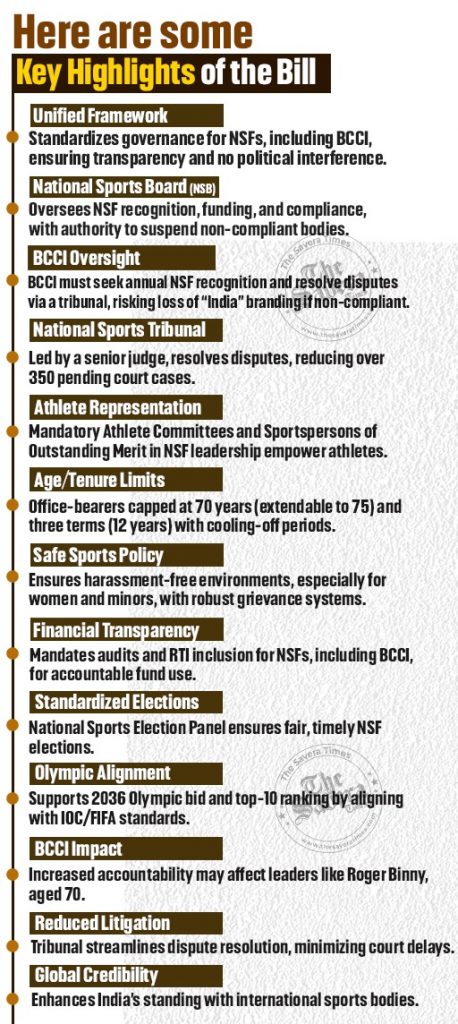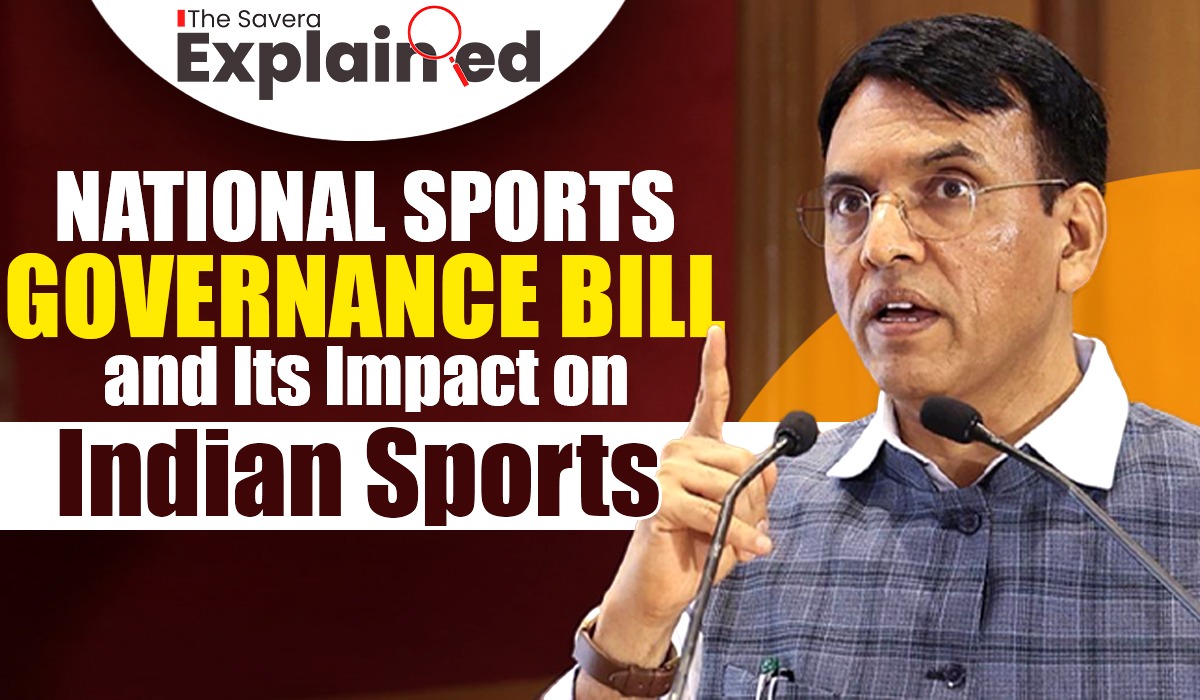New Delhi: The National Sports Governance Bill 2025, introduced by Union Sports Minister Dr. Mansukh Mandaviya in the Lok Sabha on July 23, 2025, during the Monsoon Session, aims to overhaul India’s sports administration.

This legislation seeks to enhance transparency, accountability, and athlete welfare across National Sports Federations (NSFs), including the powerful Board of Control for Cricket in India (BCCI).
By aligning with global standards like those of the International Olympic Committee (IOC) and FIFA, the bill addresses long-standing issues such as mismanagement, litigation, and lack of athlete representation, positioning India for its 2036 Olympic ambitions.
Key Provisions of the Bill:

- Unified Governance Framework: The bill establishes a standardized regulatory structure for all NSFs, including the BCCI, to ensure transparent operations and minimize political interference, aligning with global best practices.
- National Sports Board (NSB): A government-appointed NSB will oversee NSF recognition, funding allocation, and compliance with governance, financial, and ethical standards, with authority to suspend or de-recognize non-compliant bodies.
- BCCI Under Oversight: Previously autonomous, the BCCI must seek annual NSF recognition, adhere to governance norms, and resolve disputes via a tribunal, risking loss of the right to use “India” in international events if non-compliant.
- National Sports Tribunal: Led by a Supreme Court judge or High Court Chief Justice, this tribunal will address disputes involving athletes, federations, and office-bearers, aiming to reduce over 350 pending court cases and expedite resolutions.
- Athlete-Centric Governance: Mandatory Athlete Committees and inclusion of Sportspersons of Outstanding Merit in NSF leadership ensure athletes have a voice in decision-making, prioritizing their welfare.
- Age and Tenure Caps: Office-bearers face a 70-year age limit (extendable to 75 if permitted by international federations) and a maximum of three terms (12 years) with cooling-off periods, aligning with IOC and FIFA norms.
- Safe Sports Environment: The bill emphasizes harassment-free settings, particularly for women and minors, with robust grievance redressal systems to enhance athlete safety.
- Financial Transparency: NSFs, including the BCCI, will fall under the Right to Information (RTI) Act, with mandatory audits to ensure accountable use of public funds.
- Standardized Elections: A National Sports Election Panel, comprising retired election officials, will oversee fair and timely NSF elections, addressing issues like delayed polls.
- Global Alignment: The bill incorporates recommendations from the Justice Lodha Committee (for BCCI) and aligns with IOC and FIFA standards, boosting India’s credibility for hosting the 2036 Olympics.
Potential Impacts on Indian Sports
- BCCI Accountability: The BCCI, despite its financial independence, will face increased scrutiny, potentially affecting its administrative autonomy. For instance, current president Roger Binny, aged 70, may be ineligible for another term unless extended by ICC rules, impacting leadership transitions.
- Reduced Litigation: The National Sports Tribunal will streamline dispute resolution, minimizing court delays that have long plagued NSFs, ensuring faster justice for athletes and federations.
- Athlete Empowerment: By mandating athlete representation, the bill ensures fairer selections and better welfare policies, addressing grievances like those faced by wrestlers protesting in 2023 against federation misconduct.
- Global Credibility: Alignment with international standards strengthens India’s position with bodies like the IOC, supporting its bid to host the 2036 Olympics and achieve a top-10 Olympic ranking by 2036.
- Enhanced Safety and Transparency: The focus on safe sports environments and financial audits will build trust among stakeholders, ensuring public funds are used efficiently and athletes, especially women and minors, are protected.
Challenges and Concerns
- Government Overreach: Critics, including IOA president PT Usha, warn that excessive government control could lead to IOC sanctions, as seen in past suspensions of the IOA in 2012. The Sports Ministry claims consultations with IOC and FIFA mitigate this risk.
- Implementation Hurdles: Effective execution is critical to avoid bureaucratic inefficiencies, particularly in managing the NSB and tribunal without stifling NSF autonomy.
- BCCI Resistance: The BCCI’s financial clout and historical autonomy may lead to pushback against mandatory compliance, potentially sparking legal or administrative conflicts.
The National Sports Governance Bill 2025 is a bold step toward modernizing India’s sports ecosystem. By enforcing transparency, empowering athletes, and aligning with global standards, it aims to resolve systemic issues and elevate India’s sporting stature.
However, its success hinges on balanced implementation to avoid overreach while ensuring accountability.
The bill’s discussion, expected during the Monsoon Session (ending August 21, 2025), will shape its final form. If passed, it could transform Indian sports, supporting ambitions like the 2036 Olympics while fostering a fairer, safer environment for athletes.



